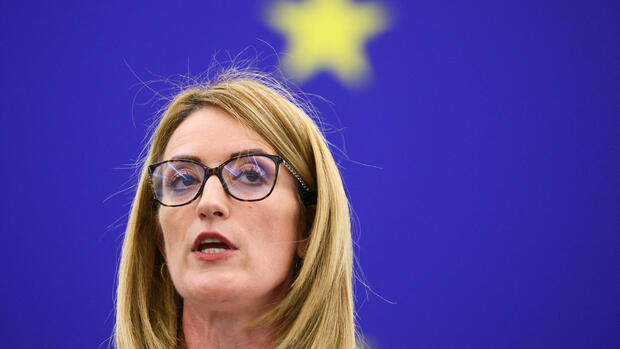Brussels The President of the European Parliament, Roberta Metsola, calls for the EU summit to send a strong signal to Ukraine. The European heads of government must keep their promises and make the accession negotiations possible by the end of the year, she said in an interview with the Handelsblatt and other European media.
The reason for the high fighting spirit of Ukrainians is not only national defense, but also the sense of belonging to the EU, Metsola said. “If the Commission makes a positive recommendation in October, then accession negotiations with Ukraine should start by the end of the year. The political signal would be powerful. It would show that the EU stands by what it says.”
The Russian war against Ukraine will be a key issue when the 27 heads of state and government meet in Brussels on Thursday. In the draft of the final declaration, which is available to the Handelsblatt, the governments confirm that they will support Ukraine militarily and financially for as long as necessary.
They also acknowledge the progress the country has made in the accession process and “encourage Ukraine to continue on the path of reforms” until all conditions are met. Metsola said there should be no special treatment for Ukraine. The country must meet the conditions for fighting corruption like any other candidate country.
She also called for institutional reform of the EU before Ukraine and other candidate countries join. An increase from 27 to 32 members would require a “complete reorganization,” she said. This ranges from representation in the EU institutions to the distribution of agricultural subsidies. That is Parliament’s position, but not necessarily that of the Member States.
Metsola: Russia not as strong as expected
The summit should also discuss what the latest attempted uprising by the Wagner mercenaries against Russia’s President Vladimir Putin means for the further course of the war. German Foreign Minister Annalena Baerbock said earlier this week that it was just one act in the Russian drama. She apparently assumes that the power struggle in Russia is not over yet.
Speaker of Parliament Metsola said last weekend’s uprising showed that Russia is not as strong as previously thought. The recent rocket attacks on Ukraine showed that the counteroffensive must be as large as possible. “The EU has a role to play, and that is long-term support for Ukraine.” She referred to the eleventh package of sanctions that has just been adopted, which is intended to curb circumvention of the sanctions, and the planned joint procurement of armaments in the EU.
Ian Bond of the Center for European Reform said the West needs to consider what more it can do to speed up Ukraine’s victory. The uprising against Putin has shown that the war is not going well for Russia. However, even the Ukrainians made little progress in driving the Russian troops out of the country.
EU leaders should consider how Ukraine can “win the peace,” he said. “That means encouraging and practically supporting integration into the EU and hopefully also into NATO.”
>> Read here: Why von der Leyen’s plans are so often canceled – the column
A contentious issue among governments is how to deal with Russia’s frozen central bank reserves. Around 200 billion euros in Russian state funds are stored in accounts in the EU and are growing thanks to interest and investment gains. Poland and the Baltic states are pushing for this money to be used for reconstruction in Ukraine. Before the summer break, the Commission intends to present a draft law on how the interest and investment gains could at least be used.
But there is considerable resistance from a number of countries, including Germany, who fear a breach of the law and damage to the reputation of the euro zone. The critics also insist on joint international action with other western countries.
The draft summit declaration now says that the Commission is invited to continue its work on a proposal “in accordance with European and international law and in consultation with partners”.
Another key summit issue is migration.
Von der Leyen demands money for migration policy
Commission President Ursula von der Leyen appealed in a letter to the heads of government to approve the additional 15 billion euros she had requested for migration policy – including for the planned partnership agreements with countries of origin and transit.
The asylum compromise recently found by the EU interior ministers is an “achievable and fair solution”, writes von der Leyen. Among other things, the pact provides for asylum procedures at the external borders and faster deportations. Until it comes into force, steps must be taken jointly with the Member States against people smugglers and more legal channels of immigration must be opened up, according to the head of the Commission. They also want to conclude further partnerships with third countries such as Tunisia.
The EU interior ministers decided on the asylum compromise with a qualified majority in early June – much to the annoyance of opponents Hungary and Poland. The heads of government of the two countries have announced that they will once again voice their protest at the summit. But the decision of the interior ministers will probably stand.
The focus is now on the European Parliament, which still has to agree. The German Greens have announced resistance. However, Metsola expects the package to be approved by a majority of Christian Democrats, Social Democrats and Liberals.
More: EU countries agree on asylum compromise – Greens in turmoil.
